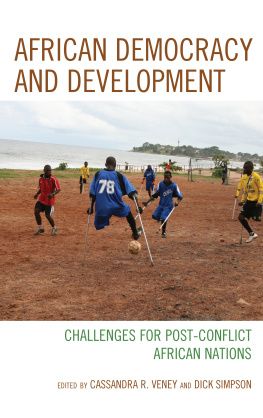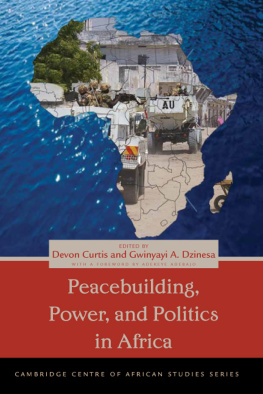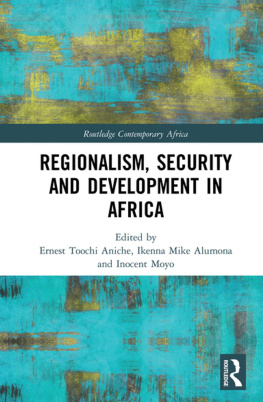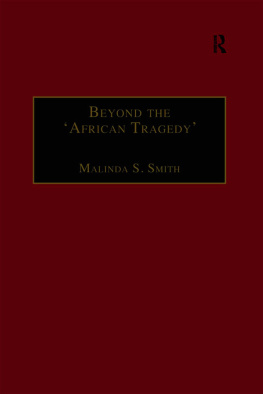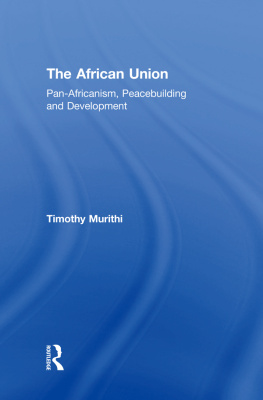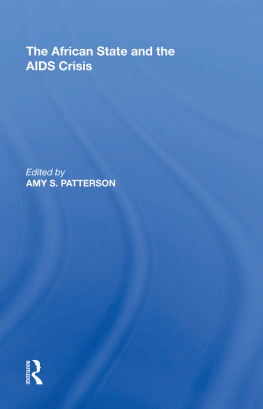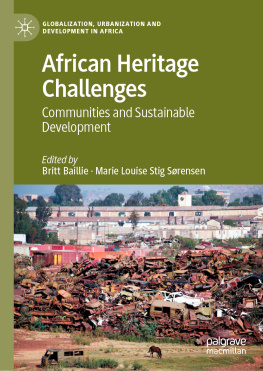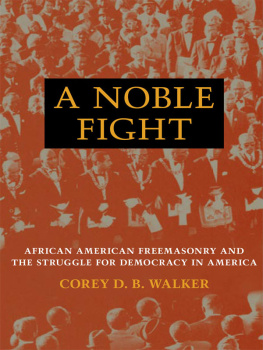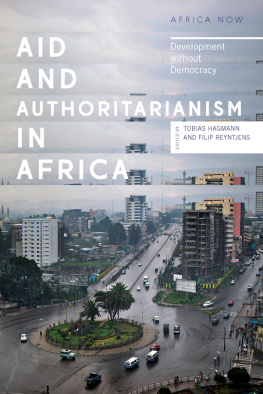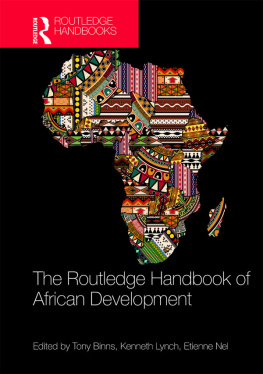Cassandra Rachel Veney - African Democracy and Development: Challenges for Post-conflict African Nations
Here you can read online Cassandra Rachel Veney - African Democracy and Development: Challenges for Post-conflict African Nations full text of the book (entire story) in english for free. Download pdf and epub, get meaning, cover and reviews about this ebook. publisher: Rowman & Littlefield, genre: Politics. Description of the work, (preface) as well as reviews are available. Best literature library LitArk.com created for fans of good reading and offers a wide selection of genres:
Romance novel
Science fiction
Adventure
Detective
Science
History
Home and family
Prose
Art
Politics
Computer
Non-fiction
Religion
Business
Children
Humor
Choose a favorite category and find really read worthwhile books. Enjoy immersion in the world of imagination, feel the emotions of the characters or learn something new for yourself, make an fascinating discovery.
- Book:African Democracy and Development: Challenges for Post-conflict African Nations
- Author:
- Publisher:Rowman & Littlefield
- Genre:
- Rating:3 / 5
- Favourites:Add to favourites
- Your mark:
- 60
- 1
- 2
- 3
- 4
- 5
African Democracy and Development: Challenges for Post-conflict African Nations: summary, description and annotation
We offer to read an annotation, description, summary or preface (depends on what the author of the book "African Democracy and Development: Challenges for Post-conflict African Nations" wrote himself). If you haven't found the necessary information about the book — write in the comments, we will try to find it.
African Democracy and Development: Challenges for Post-conflict African Nations — read online for free the complete book (whole text) full work
Below is the text of the book, divided by pages. System saving the place of the last page read, allows you to conveniently read the book "African Democracy and Development: Challenges for Post-conflict African Nations" online for free, without having to search again every time where you left off. Put a bookmark, and you can go to the page where you finished reading at any time.
Font size:
Interval:
Bookmark:
African Democracy and Development
African Democracy and Development
Challenges for Post-Conflict
African Nations
Edited by Cassandra R. Veney and
Dick Simpson
LEXINGTON BOOKS
Lanham Boulder New York Toronto Plymouth, UK
Published by Lexington Books
A wholly owned subsidiary of The Rowman & Littlefield Publishing Group, Inc.
4501 Forbes Boulevard, Suite 200, Lanham, Maryland 20706
www.rowman.com
10 Thornbury Road, Plymouth PL6 7PP, United Kingdom
Copyright 2013 by Lexington Books
Part I photo of Asmara, Eritrea, 1993 by Betty Press. Copyright by Betty Press. Reprinted with permission.
Part II photo of Masanga, Sierra Leone, 2009 by Betty Press. Copyright by Betty Press. Reprinted with permission.
Part III photo of UNICEF Center. Goma, Democratic Republic of Congo, 1994 by Betty Press. Copyright by UNICEF/Betty Press. Reprinted with permission.
Part IV photo of Freetown, Sierra Leone, 2008 by Betty Press. Copyright by Betty Press. Reprinted with permission.
Chapter 4: Memory Controversies in Post-Genocide Rwanda: Implications for Peacebuilding, Genocide Studies and Prevention, 2010, vol. 5, issue 3, pp. 293309. Reprinted with permission from University of Toronto Press Incoporated.
All rights reserved. No part of this book may be reproduced in any form or by any electronic or mechanical means, including information storage and retrieval systems, without written permission from the publisher, except by a reviewer who may quote passages in a review.
British Library Cataloguing in Publication Information Available
Library of Congress Cataloging-in-Publication Data
African democracy and development : challenges for post-conflict African nations / edited by Cassandra R. Veney and Dick Simpson.
p. cm.
The chapters in this edited volume are the result of a conference held in April 2009 at the University of Illinois at Chicago Introduction.
Includes bibliographical references and index.
ISBN 978-0-7391-7549-1 (cloth : alk. paper)ISBN 978-0-7391-7550-7 (electronic)
1. Postwar reconstructionAfrica, Sub-SaharanCongresses. 2. Postwar reconstructionSierra LeoneCongresses. 3. Nation-buildingAfrica, Sub-SaharanCongresses. 4. Nation-buildingSierra LeoneCongresses. 5. DemocratizationAfrica, Sub-SaharanCongresses. 6. Economic developmentPolitical aspectsAfrica, Sub-SaharanCongresses. I. Veney, Cassandra Rachel. II. Simpson, Dick W.
DT352.8.A3165 2012
363.349840967dc23
2012029673
 The paper used in this publication meets the minimum requirements of American National Standard for Information Sciences Permanence of Paper for Printed Library Materials, ANSI/NISO Z39.48-1992.
The paper used in this publication meets the minimum requirements of American National Standard for Information Sciences Permanence of Paper for Printed Library Materials, ANSI/NISO Z39.48-1992.
Printed in the United States of America
On April 2829, 2009, the Political Science and African American Studies Departments at the University of Illinois at Chicago hosted a conference on Development and Democracy in Post-Conflict African Nations, which was the genesis of this book. Funds from the UIC College of Liberal Arts and Sciences, the Departments of Political Science and African American Studies, and Ford Foundation Regional Office for West Africa generously supported the conference and made it and this book possible.
Conference logistics were ably handled by Stephanie Whitaker of the UIC Political Science Department. Transcribing the conference talks and placing the videotape version on the political science website was accomplished by Tom Kelly.
This book would not have reached completion without the careful editing and collection of essays by Melissa Zmuda and the careful reading of the manuscript by Assumpta Oturu. Copyediting, proofreading, and indexing were ably done by Louise Kertesz, who helped with other suggestions for improving the book as well.
Most of all, our thanks to the authors of the chapters, who have patiently worked with us during the publication process and who are dedicated to assisting the African nations about which they write.
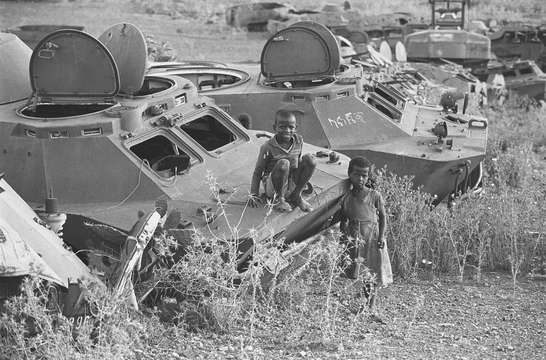
The terms conflict, peace building, peacekeeping, and post conflict are ambiguous because their meanings can and do vary depending on the circumstances. They are interconnected and intertwined. For example, peace building can and does occur during conflict. This was the case for Liberian and Sierra Leonean women who could not wait for a lasting peace agreement to be upheld while conflict waged all around them. They actively were engaged in peace building activities and strategies not just in their countries of origin but in refugee camps where they sought asylum and throughout West Africa. We also know that peace-building continues to occur during peacekeeping operations and post-conflict zones can continue to experience violence. What overlaps among all four terms and themes are issues of security, governance, and development either during or after the conflict. It is and will continue to be difficult for African countries to achieve democracy, stable governance, and development when security is lacking because security allows people to earn a living, get an education, and take care of themselves and their families. And we must bear in mind that the conflicts under review in this volume are the result not only of violence between state and non-state actors, but civilians have committed acts of violence against each other. African governments, people, and institutions have to develop and manage resolutions, policies, and programs to fit this reality. Simply put, they must be in the drivers seat to ensure that whatever gains have been achieved following the genocide in Rwanda and the cessation of violence from Liberia to Sierra Leone to Mozambique to Eritrea are undergirded by African efforts and institutions.
The chapters in this edited volume are the result of a conference held in April 2009 at the University of Illinois at Chicago. Participants represented a range of countries that included Liberia, Rwanda, Ghana, the United States, Sierra Leone, Canada, and the Netherlands. It was the goal of the conference organizers and participants to explore and address the challenges and issues that are found in post-conflict societies from an interdisciplinary perspectivewomen and gender studies, African studies, history, political science, international relations, and international development. It is not our claim that we cover the entire African continent. Specific countries included in the volume are Rwanda, Mozambique, Liberia, the Democratic Republic of the Congo, Sierra Leone, Somalia, Eritrea, Ethiopia, and Nigeria.
The aim of this volume is to analyze the various actors, agendas, constituents, and mandates that are involved in post-conflict African countries. Therefore, there are chapters that address the African Union and the United Nations, actors within civil society that include Truth and Reconciliation Commissions, African nongovernmental organizations, international nongovernmental organizations, ex-combatants, and nationals in the respective countries. The emphasis clearly is on what has transpired on the African continent. Amos Sawyer, in chapter 12, discusses the problems and issues in conflict and post-conflict countries. In addition, he provides a roadmap for African governance that must include a role for all sectors of African societies. He makes the argument that external actors and institutions should be involved in post-conflict reconstruction, but their role is to work in conjunction with Africans. In other words, outside solutions and strategies should not be superimposed on African governments and their citizens. Paul Tiyambe Zelezas chapter addresses the important role (positive and negative) that the contemporary African diaspora has and can play in post-conflict African countries by examining Liberia, Ethiopia, Somalia, and Eritrea. This is an area that needs to be addressed since it serves as an external factor as actors from outside the affected countries attempt to influence governance institutions in the hostland and homeland that may determine how governance is implemented and carried out and the level of development and democracy.
Next pageFont size:
Interval:
Bookmark:
Similar books «African Democracy and Development: Challenges for Post-conflict African Nations»
Look at similar books to African Democracy and Development: Challenges for Post-conflict African Nations. We have selected literature similar in name and meaning in the hope of providing readers with more options to find new, interesting, not yet read works.
Discussion, reviews of the book African Democracy and Development: Challenges for Post-conflict African Nations and just readers' own opinions. Leave your comments, write what you think about the work, its meaning or the main characters. Specify what exactly you liked and what you didn't like, and why you think so.

